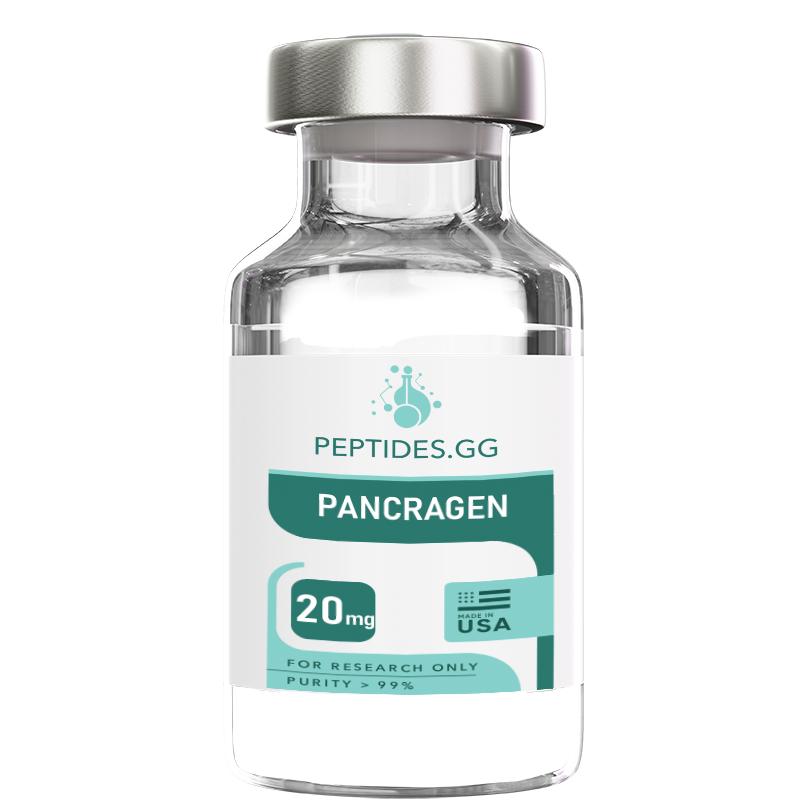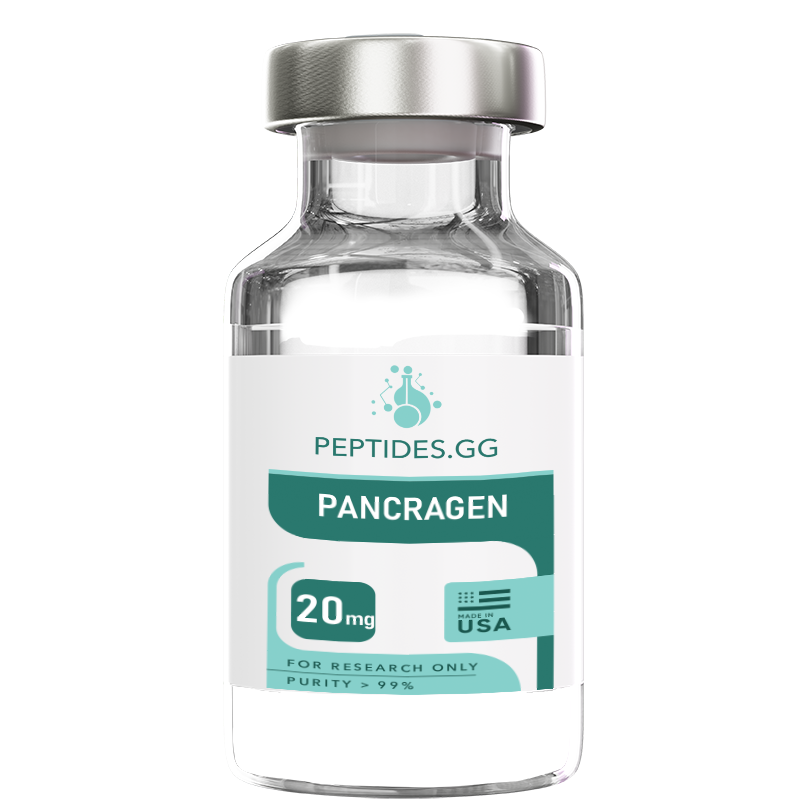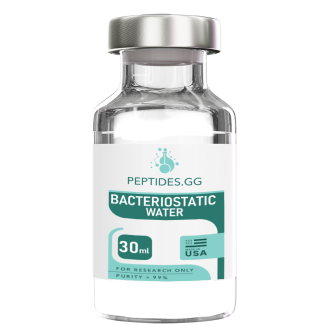Buy Pancragen peptide for research applications. High-purity Pancragen research peptide available for laboratory studies and scientific investigation. Shop premium quality research-grade peptides manufactured in the USA with comprehensive Certificate of Analysis documentation.
Important: All products are intended as research chemicals only for laboratory and in vitro testing and experimentation. All product information is educational and not to be taken as medical advice. No products are for human or animal use.
Pancragen
$60.00
- Free Delivery on all orders over $200
- Earn 5% Store Credit with Every Order
- Same Day Shipping Before 1 PM PST
- 10% Discount for Cryptocurrency Payments
14-day money-back guarantee
If you are not satisfied with the product, simply return it and we will refund your money

Buy Pancragen peptide for research applications. High-purity Pancragen research peptide available for laboratory studies and scientific investigation. Shop premium quality research-grade peptides manufactured in the USA with comprehensive Certificate of Analysis documentation.
Important: All products are intended as research chemicals only for laboratory and in vitro testing and experimentation. All product information is educational and not to be taken as medical advice. No products are for human or animal use.
Research Overview
Pancragen serves as a research tool for investigating pancreas-specific bioregulation and pancreatic tissue function in laboratory settings. This peptide bioregulator belongs to the class of organ-specific peptide preparations originally developed through research on tissue-specific regulatory mechanisms. The bioregulator concept proposes that peptide fractions derived from specific organs contain information molecules that can influence cellular function in corresponding target tissues.
Pancragen research applications extend across multiple areas of pancreatic biology including endocrine islet function, exocrine acinar cell regulation, insulin and glucagon secretion, digestive enzyme production, and pancreatic aging processes. Laboratory protocols examine these effects in cell culture systems, islet preparations, and preclinical animal models to understand pancreatic tissue regulation at molecular and cellular levels.
The peptide preparation’s pancreas-specific origin provides research interest in tissue selectivity and targeted cellular regulation. Studies investigate how bioregulator peptides interact with both endocrine and exocrine pancreatic cells, the mechanisms underlying tissue-specific effects, and potential applications in understanding pancreatic function and metabolic regulation. Research models include islet cell cultures, acinar cell systems, and various pancreatic function assessment protocols.
Molecular Characteristics
Complex Composition:
- Classification: Organ-specific bioregulator peptide complex
- Source Material: Bovine pancreatic tissue (pharmaceutical grade)
- Molecular Weight Range: 1,000-10,000 Da (heterogeneous peptide mixture)
- Peptide Content: Multiple short-chain peptides (typically 2-20 amino acids)
- Form: White to off-white lyophilized powder
- Solubility: Water, phosphate buffered saline, cell culture media
- Composition: Proprietary blend of pancreatic tissue-derived peptides
Pancragen represents a complex mixture of short peptides rather than a single molecular entity. The preparation contains multiple peptide sequences derived from pancreatic tissue, including peptides potentially originating from both endocrine and exocrine compartments, each potentially contributing to the overall bioregulatory effects observed in research models.
Bioregulator Peptide Research Background
Pancragen belongs to the research category of cytomaxes (bioregulator peptides) developed to investigate tissue-specific cellular regulation. Research on pancreatic bioregulators like Pancragen investigates these mechanisms in both endocrine (insulin-secreting beta cells, glucagon-secreting alpha cells) and exocrine (digestive enzyme-secreting acinar cells) contexts, examining how peptide signals might modulate pancreatic function and glucose homeostasis in experimental models.
Research Applications
Pancreatic Beta Cell Research
Pancragen serves as a research tool for investigating insulin-producing beta cell function:
- Insulin Secretion Studies: Investigation of glucose-stimulated insulin secretion (GSIS) and secretagogue responses
- Beta Cell Gene Expression: Research on insulin, PDX1, MAFA, and other beta cell-specific genes
- Glucose Sensing Research: Examination of GLUT2, glucokinase, and metabolic glucose sensing mechanisms
- Cell Viability and Survival: Studies on beta cell resistance to apoptosis, oxidative stress, and inflammatory damage
- Beta Cell Proliferation: Investigation of beta cell replication and mass expansion mechanisms
Laboratory protocols employ isolated islets of Langerhans, beta cell lines (MIN6, INS-1, βTC), and primary islet cell cultures to characterize Pancragen effects.
Alpha Cell and Glucagon Regulation
Research applications extend to counter-regulatory hormone function:
- Glucagon Secretion Research: Examination of alpha cell glucagon release in response to hypoglycemia
- Alpha Cell Gene Expression: Studies on glucagon, ARX, and alpha cell identity markers
- Glucose Sensing in Alpha Cells: Investigation of inverse glucose sensing mechanisms
- Alpha-Beta Cell Communication: Research on paracrine signaling within islets
- Counter-Regulatory Function: Studies on glucagon’s role in glucose homeostasis
Experimental approaches include isolated alpha cell studies, islet co-culture systems, and glucagon secretion assays.
Exocrine Pancreas Research
Laboratory studies investigate Pancragen in digestive enzyme production contexts:
- Acinar Cell Function: Research on digestive enzyme synthesis, storage, and secretion
- Pancreatic Enzyme Studies: Investigation of amylase, lipase, and protease expression and activity
- Zymogen Granule Research: Examination of enzyme packaging and regulated secretion mechanisms
- Secretin and CCK Responses: Studies on hormonal regulation of exocrine secretion
- Pancreatic Ductal Function: Research on bicarbonate secretion and fluid production
Research protocols include acinar cell cultures, pancreatic enzyme assays, and secretion measurement systems.
Pancreatic Islet Aging Research
Pancragen serves as a tool for investigating age-related changes in pancreatic function:
- Beta Cell Senescence: Examination of aging markers in islet cells and functional decline
- Age-Related Insulin Secretion: Studies on declining GSIS capacity with aging
- Islet Mass Changes: Research on age-related reduction in beta cell mass
- Oxidative Stress in Islets: Investigation of mitochondrial dysfunction and ROS accumulation
- Regenerative Capacity: Analysis of declining islet repair and replication with aging
Research protocols employ aging models, senescence-associated marker analysis, and comparative studies across age groups.
Diabetes Research Models
Laboratory studies examine Pancragen in metabolic dysfunction contexts:
- Type 1 Diabetes Models: Research on autoimmune beta cell destruction and preservation strategies
- Type 2 Diabetes Models: Investigation of beta cell dysfunction, insulin resistance interactions
- Glucotoxicity Studies: Examination of chronic hyperglycemia effects on islet function
- Lipotoxicity Research: Studies on fatty acid-induced beta cell dysfunction
- Islet Inflammation: Investigation of cytokine effects (IL-1β, TNF-α, IFN-γ) on beta cells
Experimental approaches include cytokine-treated islets, high glucose exposure, and palmitate toxicity models.
Pancreatic Regeneration Research
Pancragen research applications include tissue repair and renewal:
- Beta Cell Regeneration: Investigation of beta cell neogenesis from progenitors
- Transdifferentiation Studies: Research on alpha-to-beta cell conversion mechanisms
- Ductal Cell Differentiation: Examination of pancreatic progenitor potential
- Acinar-to-Beta Conversion: Studies on cellular plasticity in pancreatic compartments
- Islet Transplantation Research: Investigation of islet survival and function post-transplantation
Research models include lineage tracing, injury-regeneration protocols, and islet transplantation studies.
Laboratory Handling and Storage Protocols
Lyophilized Powder Storage:
- Store at 2-8°C (refrigerated) in original sealed vial
- Protect from light exposure and moisture
- Do not freeze lyophilized powder
- Stable for 24 months refrigerated as unopened vial
Reconstitution Guidelines:
- Reconstitute with sterile water, bacteriostatic water, or appropriate buffer
- Add 1-2mL solvent per 10mg powder depending on desired concentration
- Gentle swirling motion recommended
- Final pH should be 6.5-7.5 for cell culture applications
Reconstituted Solution Storage:
- Short-term: 2-8°C for up to 7 days
- Long-term: -20°C in aliquots
- Avoid more than 2-3 freeze-thaw cycles
- Sterile filtration (0.22μm) recommended for cell culture
Quality Assurance and Analytical Testing
Peptide Profile Analysis:
- HPLC: Peptide content profile verification
- Molecular weight distribution by size exclusion chromatography
- Amino acid analysis
- Peptide content determination
Purity and Contaminant Testing:
- Protein purity by Bradford or BCA assay
- Bacterial endotoxin: <10 EU/mg
- Sterility testing
- Water content: <8%
Source Material Verification:
- Pharmaceutical-grade bovine pancreatic tissue
- TSE/BSE compliance
- Standardized extraction protocols
- Batch-to-batch consistency testing
Research Considerations
Experimental Design Factors:
1. Concentration Selection: Typically 0.1-10 μg/mL in cell culture
2. Treatment Duration: 24-72 hours for gene expression; shorter for acute secretion studies
3. Cell Type Specificity: Verify pancreatic selectivity through comparative studies
4. Islet Culture Challenges: Maintain proper oxygenation and glucose concentrations
5. Complex Mixture: Account for potential multiple active components
Control Groups:
- Vehicle control
- Non-specific peptide control
- Positive controls (glucose, GLP-1, etc.)
- Tissue-specific comparisons
Mechanism Investigation:
- Transcription factor regulation (PDX1, MAFA, NEUROD1)
- Insulin signaling pathway modulation
- Glucose sensing mechanism effects
- Calcium signaling in beta cells
- Mitochondrial function regulation
Compliance and Safety Information
Regulatory Status:
Pancragen is for in-vitro laboratory studies and preclinical research only. Not approved for human therapeutic use, dietary supplementation, or medical applications.
Intended Use:
- In-vitro cell culture research
- Islet and pancreatic tissue studies
- In-vivo preclinical research in approved animal models
- Academic and institutional research
NOT Intended For:
- Human consumption or administration
- Therapeutic treatment or diagnosis
- Dietary supplementation
- Veterinary applications without oversight
- Medical or clinical applications
—
 25% OFF $400+ • 35% OFF $800+ ALL WEEKEND
25% OFF $400+ • 35% OFF $800+ ALL WEEKEND 



